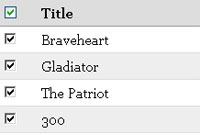Generate Readable Byte Labels Using PHP
Whenever you manage disk space, it's infinitely easier to read when when the bytes are displayed in KB, MB, GB... format. When reading files on the disk, the server returns the disk space in bytes so it's on us programmers to program file sizes for display. Using PHP, this task is cake.
function format_bytes($bytes)
{
$labels = array('B','KB','MB','GB','TB');
for($x = 0; $bytes >= 1024 && $x < (count($labels) - 1); $bytes /= 1024, $x++);
return(round($bytes, 2).' '.$labels[$x]);
}
Users will appreciate this!
![CSS @supports]()
Feature detection via JavaScript is a client side best practice and for all the right reasons, but unfortunately that same functionality hasn't been available within CSS. What we end up doing is repeating the same properties multiple times with each browser prefix. Yuck. Another thing we...
![Being a Dev Dad]()
I get asked loads of questions every day but I'm always surprised that they're rarely questions about code or even tech -- many of the questions I get are more about non-dev stuff like what my office is like, what software I use, and oftentimes...
![“Top” Watermark Using MooTools]()
Whenever you have a long page worth of content, you generally want to add a "top" anchor link at the bottom of the page so that your user doesn't have to scroll forever to get to the top. The only problem with this method is...
![Check All/None Checkboxes Using MooTools]()
There's nothing worse than having to click every checkbox in a list. Why not allow users to click one item and every checkbox becomes checked? Here's how to do just that with MooTools 1.2.
The XHTML
Note the image with the ucuc ID -- that...




I always like using the right-shift operator for this kind of stuff. So instead of:
$bytes /= 1024
I would use:
$bytes >>= 10
Of course, you lost the digits after the decimal point (unless you get fancy), but on the plus side, it’s way faster than floating point division. The shift operators must be some of the loneliest operators in PHP, don’t you think?
Nice one!
I did a similar function … somewhat overkill, but a usefull thing over the years =)
http://openminds.lucido-media.de/human-readable-bytes-sorry-php-net